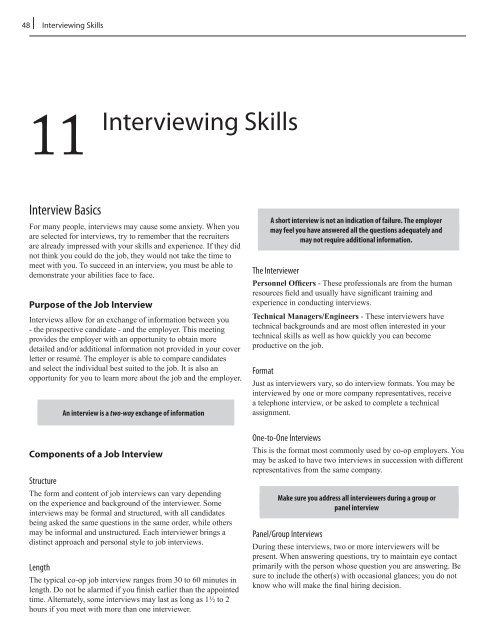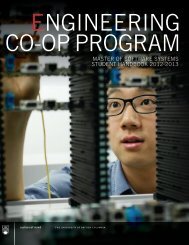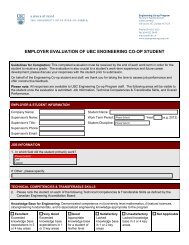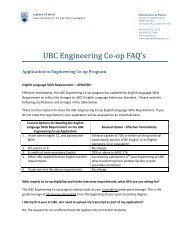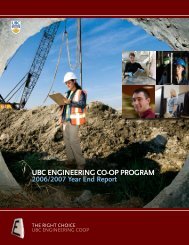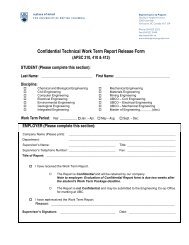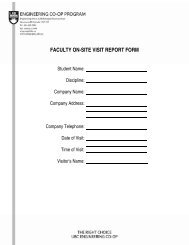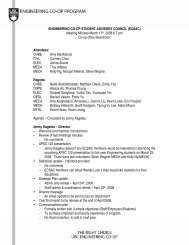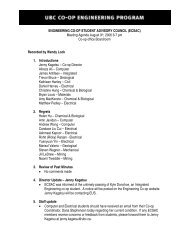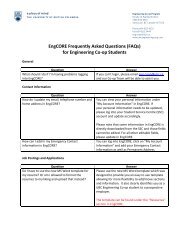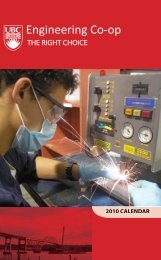ENGINEERING CO-OP PROGRAM
Download - Engineering Co-op Office - University of British Columbia
Download - Engineering Co-op Office - University of British Columbia
- No tags were found...
Create successful ePaper yourself
Turn your PDF publications into a flip-book with our unique Google optimized e-Paper software.
48 Interviewing Skills<br />
11<br />
Interviewing Skills<br />
Interview Basics<br />
For many people, interviews may cause some anxiety. When you<br />
are selected for interviews, try to remember that the recruiters<br />
are already impressed with your skills and experience. If they did<br />
not think you could do the job, they would not take the time to<br />
meet with you. To succeed in an interview, you must be able to<br />
demonstrate your abilities face to face.<br />
Purpose of the Job Interview<br />
Interviews allow for an exchange of information between you<br />
- the prospective candidate - and the employer. This meeting<br />
provides the employer with an opportunity to obtain more<br />
detailed and/or additional information not provided in your cover<br />
letter or resumé. The employer is able to compare candidates<br />
and select the individual best suited to the job. It is also an<br />
opportunity for you to learn more about the job and the employer.<br />
An interview is a two-way exchange of information<br />
The Interviewer<br />
Personnel Officers - These professionals are from the human<br />
resources field and usually have significant training and<br />
experience in conducting interviews.<br />
Technical Managers/Engineers - These interviewers have<br />
technical backgrounds and are most often interested in your<br />
technical skills as well as how quickly you can become<br />
productive on the job.<br />
Format<br />
A short interview is not an indication of failure. The employer<br />
may feel you have answered all the questions adequately and<br />
may not require additional information.<br />
Just as interviewers vary, so do interview formats. You may be<br />
interviewed by one or more company representatives, receive<br />
a telephone interview, or be asked to complete a technical<br />
assignment.<br />
Components of a Job Interview<br />
Structure<br />
The form and content of job interviews can vary depending<br />
on the experience and background of the interviewer. Some<br />
interviews may be formal and structured, with all candidates<br />
being asked the same questions in the same order, while others<br />
may be informal and unstructured. Each interviewer brings a<br />
distinct approach and personal style to job interviews.<br />
Length<br />
The typical co-op job interview ranges from 30 to 60 minutes in<br />
length. Do not be alarmed if you finish earlier than the appointed<br />
time. Alternately, some interviews may last as long as 1½ to 2<br />
hours if you meet with more than one interviewer.<br />
One-to-One Interviews<br />
This is the format most commonly used by co-op employers. You<br />
may be asked to have two interviews in succession with different<br />
representatives from the same company.<br />
Make sure you address all interviewers during a group or<br />
panel interview<br />
Panel/Group Interviews<br />
During these interviews, two or more interviewers will be<br />
present. When answering questions, try to maintain eye contact<br />
primarily with the person whose question you are answering. Be<br />
sure to include the other(s) with occasional glances; you do not<br />
know who will make the final hiring decision.


